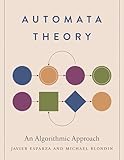Automata theory : An algorithmic approach
Material type: TextLanguage: English Publication details: The MIT press England Description: xii, 538p. illISBN: 9780262048637 (HB)Subject(s): Machine theory | Mathematics
TextLanguage: English Publication details: The MIT press England Description: xii, 538p. illISBN: 9780262048637 (HB)Subject(s): Machine theory | Mathematics BOOKS
List(s) this item appears in:
New Arrivals (16 December 2024)
BOOKS
List(s) this item appears in:
New Arrivals (16 December 2024)
| Current library | Home library | Call number | Materials specified | Status | Notes | Date due | Barcode |
|---|---|---|---|---|---|---|---|
| IMSc Library | IMSc Library | 519.713 ESP (Browse shelf (Opens below)) | Not for loan | New Arrivals Displayed Till 31st December 2024 | 78302 |
Included index
Includes bibliographical (p. 531-538) and references
I. Automata on Finite Words
1 Automata Classes and Conversions
2 Minimization and Reduction
3 Operations on Sets: Implementations
4 Application 1: Pattern Matching
5 Operations on Relations: Implementations
6 Finite Universes and Decision Diagrams
7 Application II: Verification
8 Automata and Logic
9 Application III: Presburger Arithmetic
II Automata on Infinite Words
10 Classes of Automata and Conversions
11 Boolean Operations: Implementations
12 Emptiness Check: Implementations
13 Application I: Verification and Temporal Logic
14 Application II: MSO Logics on Words and Linear Arithmetic
----------Solutions----------
This textbook presents automata theory from a fresh viewpoint inspired by its main modern application, program verification, where automata are viewed as data structures for the algorithmic manipulation of sets and relations. This novel “automata as data structures” paradigm makes holistic connections between automata theory and other areas of computer science not covered in traditional texts, linking the study of algorithms and data structures with that of the theory of formal languages and computability. Esparza and Blondin provide incisive overviews of core concepts along with illustrated examples and exercises that facilitate quick comprehension of rigorous material.
• Uses novel “automata as data structures” approach
• Algorithm approach ideal for programmers looking to broaden their skill set and researchers in automata theory and formal verification
• The first introduction to automata on infinite words that does not assume prior knowledge of finite automata
• Suitable for both undergraduate and graduate students
• Thorough, engaging presentation of concepts balances description, examples, and theoretical results
• Extensive illustrations, exercises, and solutions deepen comprehension


There are no comments on this title.